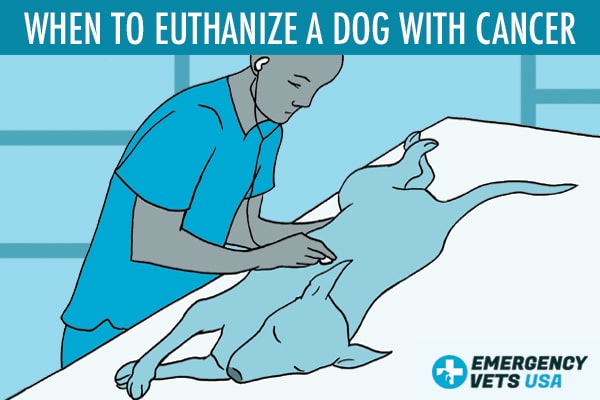When To Euthanize A Dog With Cancer
Our canine companions are a member of our family, making a cancer diagnosis extremely devastating.
Not only is it difficult to hear the words, but many owners struggle with understanding the process of their disease and when it’s actually time to let them go.
In this article we will help you understand the diagnosis of cancer in dogs.
The signs that your dog may be struggling in their disease and when it’s time to consider letting your furry friend go.

Consider Your Dog’s Specific Situation
Before we dive into the conversation of when to euthanize a dog with cancer, it’s important to realize that every dog is different.
While some pet parents discover a dog’s cancer during a drastic decline in their health, others may discover the issue during a routine exam of their happy pup.
Some dogs will have a short span of happy days after their cancer diagnosis. And others will continue to live comfortably for months on end.
Our pups are just like humans in the sense that each and every body will respond differently to medical conditions.
While your veterinarian’s guidance will help you maneuver this upcoming journey with your sick canine, your daily observations and understanding of their personality will help you make this decision as well.
Now that you understand how different each situation can be based on the dog in question, let’s get into the common types of cancer in dogs.
Common Types of Cancer in Dogs
While there is a long list of cancers that can impact our furry friends, there are some common ones that are seen often in the veterinary office.
Some of the common types of cancer in dogs include:
- Lymphoma
- Mast Cell Tumors
- Hemangiosarcoma
- Osteosarcoma (Bone Cancer)
- Melanoma
- Gastrointestinal Cancer
- Malignant Mammary Tumors
- Lung Cancer
- Oral Cancer
Each of these types of cancer can cause an array of symptoms.
These symptoms are usually why a concerned owner brings their dog to the vet.
This can include:
- New or fast growing masses on the body
- Weight loss
- Change in appetite
- Lethargy
- Limping or lameness
- Unusual swelling
- Changes in breathing
- Vomiting
- Diarrhea
- Neurological problems (brain tumors)
- and many other changes in behavior
How Are Dogs Tested For Cancer?

When it comes to diagnosing cancer in dogs, there are a number of ways to go about this.
The protocol will often differ based on the symptoms your dog presents with.
This just means that the route of testing is usually different for each dog.
Some of the most common ways to test for cancer in dogs include:
- Needle aspiration of masses
- Biopsy of tissue
- Blood testing
- X-rays
- Ultrasound
- MRI
Diagnosing cancer in dogs can be challenging at times, meaning your vet will likely use multiple forms of diagnostics to get to the bottom of their symptoms.
Using multiple forms of testing is the best way to get the entire picture.
Can You Make A Dog With Cancer Comfortable?
So what do you do now once your dog is diagnosed with cancer?
Are they bound to suffer each day they go on, or are there ways to improve the time they have left?
The answer to this question will vary based on the cancer your dog is diagnosed with.
Based on your dog’s specific diagnosis, your vet will try their best to make their life as comfortable as possible.
This may include offering them a special diet, offering pain management if needed, controlling undesirable GI issues, implementing frequent check ups, and offering tips for comfort that you can apply at home.
Establishing a close relationship with your veterinarian is key for keeping your dog comfortable.
Signs That It’s Time To Say Goodbye To A Dog With Cancer
So how do you know when it’s time to let your canine companion go?
Since we can’t ask our dogs how they are feeling each day, it’s important to understand the signs of a sick dog.
Some of the signs that it’s time to say goodbye to a dog with cancer include:
- Drastic decline in their appetite or no interest in eating at all
- Rapid weight loss
- Vomiting or diarrhea that persists
- Lameness or limping that will not resolve
- Changes in breathing
- Lethargy or disinterest in things they once loved
- Difficulty moving and getting around each day
- Slowing down
- Any other drastic shift in their daily habits
You know your canine friend well, so it’s up to you to be their advocate when their behaviors and daily interests begin to shift.
If you think your pup is beginning to suffer, it may be time to speak to your vet about Euthanasia.
My Dog Has Cancer But Acts Fine
Like we mentioned above, some dogs can continue to live comfortable lives despite their cancer diagnosis.
It’s extremely hard to euthanize a dog that is still happy and living life normally, and you should not feel the pressure of having to euthanize your dog the moment they are diagnosed.
So many pet owners feel a weight on their shoulders to make a fast decision when their dog is diagnosed with cancer, but it does not always have to be that way.
While some dogs will experience a sudden decline in health that warrants a quick decision, others will carry on comfortably in the following months, even years.
If your dog is still acting fine and your vet agrees that they are not currently suffering, there is nothing wrong with continuing to spend time with your beloved companion.
As long as you are staying on top of their illness and keeping your vet updated as time goes on, you can make the most of the time you have left with your special pup.
Final Thoughts
There is nothing worse than the thought of saying goodbye to our furry family members, and we understand how important the time you have left with them is.
Be sure to review the tips we’ve listed above on how to know when to euthanize a dog with cancer, so you can responsibly soak in the remaining days with your canine companion.

My name is Amber. I am a dedicated animal lover that turned my passion into my career. I am a Licensed Vet Tech with 12 years of experience in veterinary medicine, but I recently took my career online to help spread accurate information on animal care. With how vast the online world is, I have a strong desire to ensure that the reader always walks away with helpful pet advice. With the experience I’ve gained from my time in this field, I have been able to travel the world, offering my services to as many animal rescues as I can find. If I am not at my laptop, or back home visiting family, you can find me somewhere in the world, cuddling every furry friend that I can find! More About Us

Want to talk with other people going through difficult decisions? We have created a Facebook Group here – https://www.facebook.com/groups/emergencyvetsusa – Join and ask your questions, get support and feel heard.
My dog will be 6 at the end of this month. She has osteosarcoma and within the last two weeks her leg that has been lame for a few months now, despite treatment, is now swollen so big and her veins are visible in her leg. Her paw is huge and swollen as well. She doesn’t like to get up to do anything, and understandably so, she is clearly in pain. We have tried to treat her with CBD Oil, fish oil, raw food diet, and numerous holistic remedies. She is on Gabapentin and Maloxicam for pain and inflammation but it isn’t working. She is struggling. She spends most of her days just laying around, either sleeping, or staring off into space. She has lost 40 lbs (she’s and American Bulldog, so she’s big.) She still wags her tail, and shows love, but I can tell she is suffering. My husband doesn’t want to euthanize her, and I don’t know what to do at this point. We can’t just let her slowly die a painful death. Any advice.
I just lost my beloved Labrador to cancer and he had just turned 5 years. No prior evidence of cancer and he was super healthy running several miles a day along my ATV. On 3/3/22 we were coming back from a run and I noticed he started walking about half way back and then didn’t eat much dinner. On the morning of 3/4/22 I took him to the vet explained what was going on so they x-rayed his stomach and they said he ingested something and they needed to do surgery. They opened him up and his stomach and part of his intestine was loaded with lymphoma cancer. I had to put him down while on the table and couldn’t even say goodbye to him. It sounds like your baby is in pain, I know how much you love him but your true love to him would be to end his suffering. I lost Max’s brother at 3 years 11 months due to spinal lymphoma it hit him so quick and was in pain until I ended his suffering. It is not an easy decision but it is one you will need to make, do not let him suffer because you want to keep him alive. He will thank you for it. Good luck my friend.
My spaniel was diagnosed with osteosarcoma/nasal tumor. He has a massive growth across his head as a result his eye is no existent. Part of the tumor burst open and keeps bleeding as well as from his nose his gums are also very pale. He is eating little but drinking water and is keen to go for a walk and happy. When do I put him to sleep. He is on pain medication and blood clotting medication.
My 12 year old dachshund had a large tumor in his liver 2.5 yrs ago. We put him on Dememarin. He if failing. His gums are almost white, his belly is extended and his spine is arched. He is sleeping more but seems to still be happy. The vet gave us Gabapentin for pain. I just don’t know how much pain he is in. How do I know when to put him to sleep? We love him so much but don’t want him to suffer.
While I cannot say for sure, it does sound like it may be time to speak with your veterinarian about saying goodbye to your pup. The liver is responsible for red blood cell production and clotting factors in the blood, which can cause a dog to become anemic in the late stages of liver failure (this is likely why your dog has pale gums and is lethargic). This is usually a serious symptom that presents in the late stages of liver disease, so I do think it’s time to discuss quality of life with your veterinarian.
Hi! My dog was just diagnosed with the same. Reading your comment that your dog was still with you and still happy 2.5 years after the original discovery of the tumor gives me so much hope. I am sure he knew how much he was loved until the very end. Warm regards
My 20yr old lab was dx with cancer…I see her decline every day. I too don’t won’t her to suffer but don’t won’t to lose her either. So darn hard